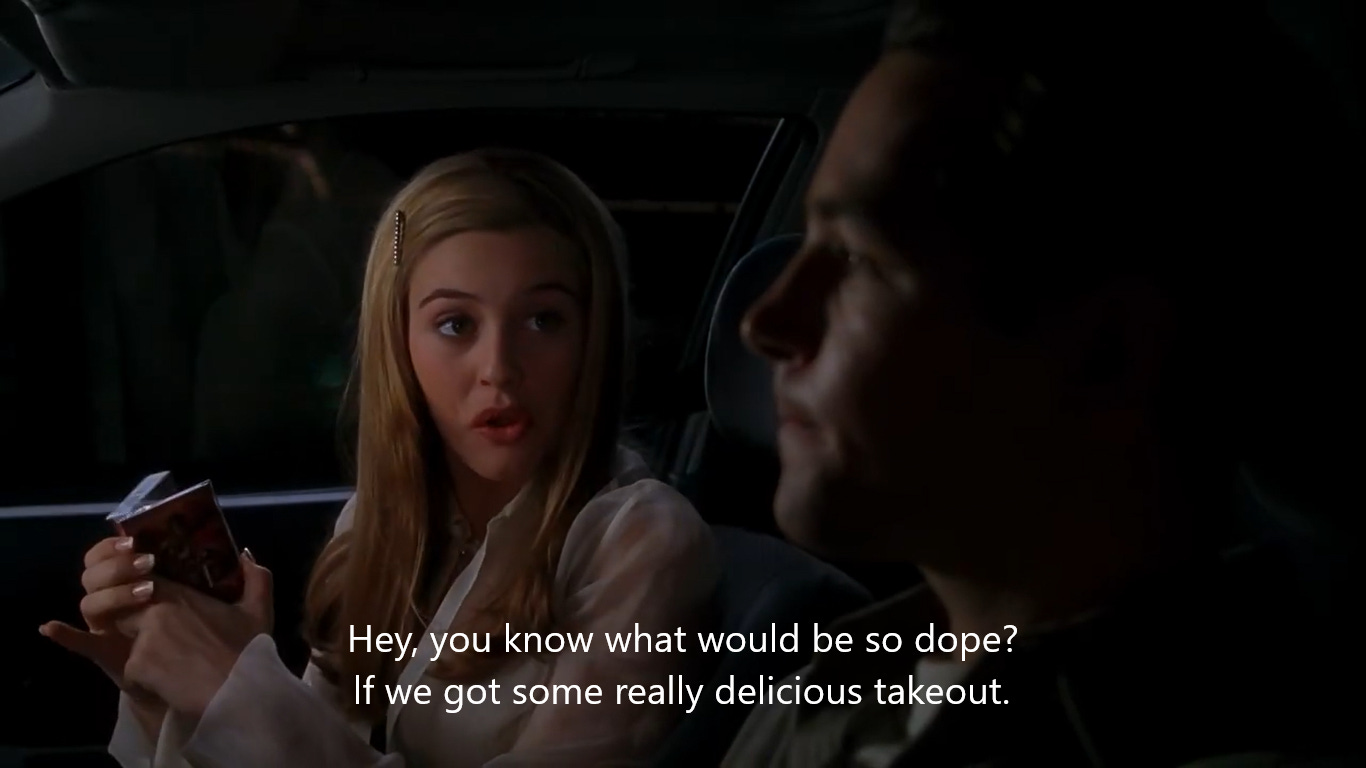Serially breaking the Renoir Rule whereby a film’s title should never be mentioned in the film itself, Clueless isn’t actually the film you think it is when you mention it to a friend or think about it without watching it. Clueless is first of all the word ‘clueless’ dropped in the microoxic pool of its own big picture. Clueless is, perhaps now for a first time predictably, the journey of the word ‘clueless’ like a shark fin through the same pool waters that are actually clear. If you’ve entered in through the side door that says ‘Cher is stupid’ or ‘Clueless means a remake of Bouvard et Pécuchet’ i.e. all the dumb paradoxes of stupidity and bêtise, then you’re maybe not quite as clued-up as you think you look, but whatever. Search to find signs that Cher is stoopid, and you will relent. So what. This only proves that you have no beginner’s mind, were the film not more innocent than that, remaining diaphanously clueless in its own exculpatory fugue as a chance—Cher’s first and last chance. At no stage is it even suggested that you are the stooopid one, as that would be ‘way harsh’. What is ‘so dope’ instead is to realise that intelligence as that which is being, ugh, raised up and emptied out in direct proportion to its absence, is also becoming quantically ‘empty’. In fact, the breaking of the Renoir Rule allows us to mark several things in Clueless’ use of its own good name:
First of all, we mark a structurally aloof and ‘clueless’ x-point of view, a moment of human pitfall and ubiquitous relapse that threads us through a midnight snack and takeout for the generic species-being, adumbrated and involuted, now online. Tom Cohen defines this non-apex as follows:
There is something stunning about the fact that the greatest sophistication in tracking contemporary teletechnologies coincides with a relapse simultaneously into the most precritical positions of asserted or affirmed immediacy, presence, body, lived experience.
The x-point whereby the greatest technical sophistication coincides, in granular terms, with the largest quanta of relapse, is Cher’s lack of assumption itself, her formal ‘cluelessness’—as calculated for a genealogical passover that now won’t take place. Just that is relapse as ubiquitous.
And secondly that’s where things get complicated. What is stupid, if anything, is the architecture of this relapse meeting the thrust of its own digital sophistication, and yet that which is ‘clueless’ is merely the outshining that takes place around a certain ‘all’.
For Cher, as a third point, everything is conventional, including the matheme and the poem, because she starts out from the beginner’s mind of repetition and wanting for the other to be free of name and status. Cher’s chance is that she is never co-dependent according to the nominal legends. It just doesn’t occur to her to put anyone else before her. ‘You’ and ‘your you’ become her ‘project’, which is not to say a projection, but a doll and angelicist clone. The project is eidetic variation of the All.
The film, duh, is a lure. It lets you think you can master the Flaubertian metaphysical Maoware enough to enter in and dream of Cher’s inferiority, but that fails to take place at every equidistant point. The fact is that Cher is never stupid, and in watching . . . you occupy the same place she does.
Cher is a Dakini. This film made sure we would Tibetanize her before stupidity itself had taken over.




